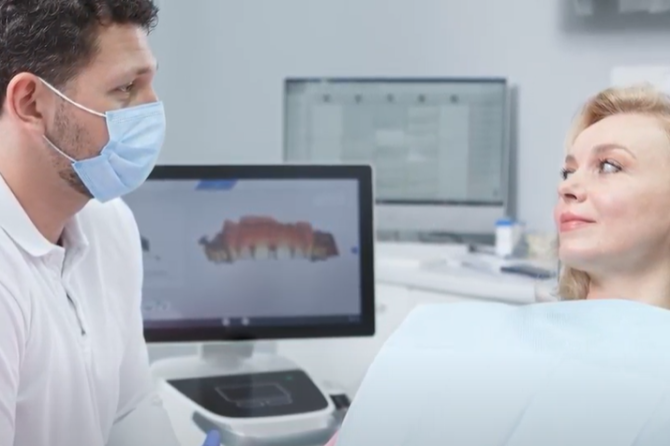
When faced with tooth loss, whether from decay, injury, or disease, you have several options to
restore your smile and maintain oral health. Two of the most common solutions are dental
implants and bridges. Each has distinct advantages, limitations, and considerations that might
make one more suitable for your unique situation than the other.
What Are Dental Implants?
A dental implant is a small titanium screw surgically placed into the jawbone beneath the gum
line. This post acts as an artificial tooth root and provides a strong foundation for a replacement
tooth (crown). It takes 2-3 appointments to complete the full process, but the process is very
predictable.
Advantages of Dental Implants
- Longevity: With proper care, implants can last a lifetime, making them a potentially permanent solution
- Bone preservation: Implants stimulate bone growth and prevent bone loss that typically occurs after tooth loss
- Independence: Implants don’t rely on other teeth for support
- Natural look and feel: They closely resemble natural teeth in appearance and function
- No dietary restrictions: You can eat all your favorite foods without worry
- Oral hygiene: Can be cleaned just like natural teeth with regular brushing and flossing
Potential Drawbacks
- Higher initial cost: Implants typically have a higher upfront investment
- Surgical procedure: The process requires surgery and longer treatment time
- Bone density requirements: Sufficient bone is needed to support the implant (though bone grafts can sometimes address this)
- Health considerations: Certain conditions like uncontrolled diabetes may complicate the healing process
Understanding Dental Bridges
Dental bridges have been a reliable tooth replacement option for decades, “bridging” the gap
created by one or more missing teeth.
What Are Dental Bridges?
A dental bridge consists of one or more artificial teeth (pontics) held in place by dental crowns
cemented to the natural teeth or implants on either side of the gap. The process usually takes two
appointments to complete, making it a quicker option than implants.
Advantages of Dental Bridges
- Lower initial cost: Generally less expensive upfront than implants
- Quicker process: The entire procedure can be completed in a few weeks
- Non-surgical: No surgery required for traditional bridges
- Effective with bone loss: Can still be an option when bone loss would complicate implant placement
- Aesthetically pleasing: Modern bridges look natural and restore a complete smile
Potential Drawbacks
- Potential shorter lifespan: Typically last 5-20 years before needing replacement
- Affects adjacent teeth: Requires modification of healthy neighboring teeth
- Doesn’t prevent bone loss: Unlike implants, bridges don’t stimulate bone growth
- Different oral hygiene: Requires special cleaning tools and techniques
- Potential wear on supporting teeth: May put additional stress on the teeth supporting the bridge
Key Factors in Your Decision
Health Considerations
- Bone density: Sufficient jawbone is essential for implants
- Gum health: Periodontal disease should be addressed before either procedure
- Overall health: Certain conditions may impact healing after implant surgery
- Smoking: Can significantly affect implant success rates
Practical Factors
- Time commitment: Implants require multiple visits over several months; bridges can be completed in 2-3 visits
- Budget: Consider both initial costs and long-term value
- Insurance coverage: Check what your dental insurance will cover
- Location of missing tooth/teeth: Front teeth vs. molars may affect your decision
- Number of missing teeth: Multiple adjacent missing teeth might make bridges more practical
- Maintenance requirements: Bridges require special cleaning tools; implants are maintained like natural teeth
- Replacement expectations: Bridges will likely need replacement; implants may last a lifetime
- Future dental work: How your choice might affect future dental treatments
Cost Comparison
While costs vary significantly based on location, provider, and specific needs, general price
ranges are:
Dental Implants:
- Single tooth implant: $3,000-$6,000 (including implant, abutment, and crown)
- Higher initial investment but potentially better long-term value due to longevity
Dental Bridges:
- Traditional three-unit bridge: $2,000-$5,000
- Lower upfront cost but may require replacement every 5-15 years
Both dental implants and bridges offer effective solutions for tooth replacement, each with
distinct advantages. Consider your priorities:
Choose implants if:
- You value a long-term, potentially permanent solution
- Preserving jawbone is a priority
- You don’t want to alter adjacent healthy teeth
- You’re willing to undergo a surgical procedure and longer treatment time
- Your budget allows for a higher initial investment
Choose bridges if:
- You prefer a non-surgical procedure
- You need a quicker solution
- Your budget favors a lower upfront cost
- You have insufficient bone density for implants (and don’t want bone grafting)
- Adjacent teeth would benefit from crowns anyway
The best approach is to consult with your dentist for a thorough evaluation and personalized
recommendation based on your specific oral health needs, lifestyle considerations, and budget.
Remember that what works best for someone else may not be the ideal solution for you.


